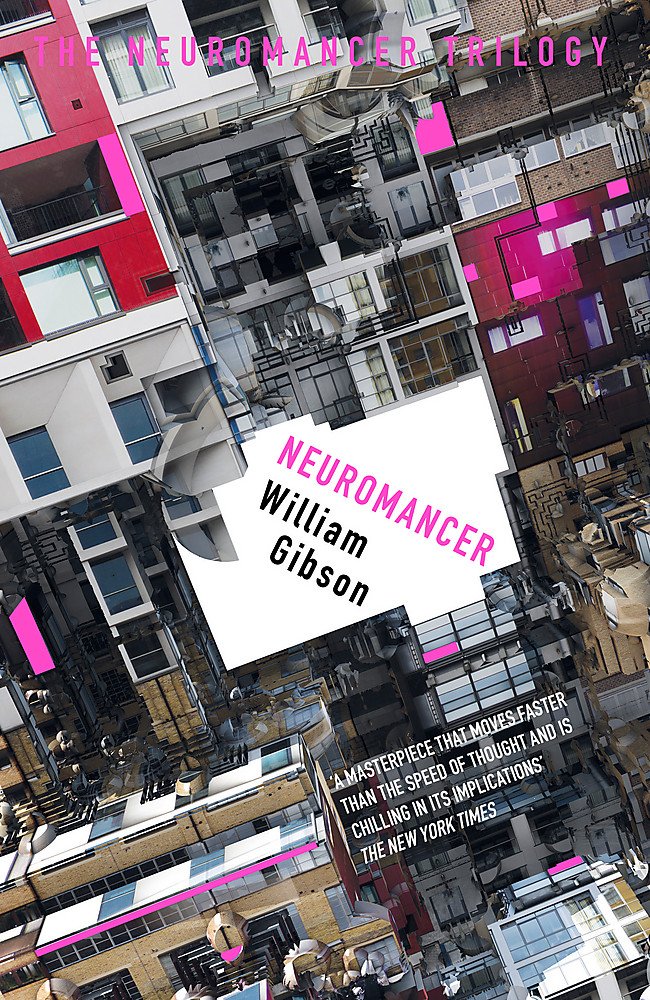I snapped up Neuromancer by William Gibson off Amazon at the same time I bought the game Cyberpunk 2077 (a game which drew a lot inspiration from the book). The recommendation came from YouTube video game reviewer, Tim Rogers. Neuromancer has been cited as the quintessential work of the cyberpunk genre. As I had a lot of hopes for it, and it was time to switch to fiction after reading about FDR, I bumped it to the front of my reading queue.
Neuromancer’s first chapter “Chiba City Blues” starts off with the line “The sky above the port was the colour of television , tuned to a dead channel.” From here, the rest of the book sort of flickers through the life of former hacker Henry Doresett Case as he goes from being a down and out drug addict to professional mercenary lured back into his profession for one last score.
On the surface, this story sounds intriguing, if not a little hackneyed. The futuristic setting as imagined from a 1980s perspective also sounded like a few other books and movies that I really enjoy. In fact, there’s a lot in this book that seems to have inspired or have coincidental similarities to some of my favorite movies such as Escape from New York and the Matrix.
Reading the book, however, was an unpleasant experience. The opening setting in Chiba sort of hinted at this but I was okay with this. The book threw in some Japanese words which I didn’t have trouble with. At one point, the author randomly inserted the word “Sanpaku”; a word that I learned only last year meaning an eye with white space between the iris and lower eyelid – literally three white spaces surrounding an eye. No doubt the author felt as smug using this word as I felt when I understood it. After Chiba City Blues however, the plot takes us to Turkey and then elsewhere and probably some other places too.
As the plot became increasingly difficult to follow, the strange unexplained niche words became the least of my problems. New characters would suddenly show up without any introduction and old characters would suddenly change motivations or just do things for no reason with no explanation. At one point X tries to kill Y but it’s okay because Y killed X 5 minutes ago. Also the gang are in Turkey or the matrix or somewhere else. What are they even doing? About two thirds of the way in, I ended up feeling annoyed with the book – so much so that I started complaining about it to my friends or anyone who would listen. How is this book so critically acclaimed when it’s so incomprehensible. This feeling was accompanied by a more self conscious feeling of embarrassment. “Maybe it’s me. The book is brilliant and I’m just not getting it”. Or maybe I was reading it the wrong way? Apparently, I’d once tried to read Ulysses the wrong way before so that was also possible.
I started reading reviews for the book online on Amazon and Goodreads – not something I usually do when reading a book – because I had to know if other people had the same problems. The most insightful reviews were from people who acknowledge the odd structure and pacing of Neuromancer while also expressing it as a reason that they like the book. “It’s supposed to be disorienting”. So I plodded on and finished the book with this in mind. After reading the book I looked up the summary on wikipedia and confirmed that i hadn’t actually missed anything – I knew what was going on but it felt as if it was all going completely over my head.
Reading Neuromancer certainly was a different kind of reading experience. I felt that I might have liked the book if it wasn’t so scattered. The AI itself is interesting (and coherent) in every single appearance and whenever it speaks is when the book makes the most sense. Maybe this was intentional? At one point the main character tells the AI that *he* can’t understand anything the AI is talking about. I felt like asking Case to shut up because I hadn’t understood a thing he had been doing since he left Chiba. The character Armitage as a mysterious contractor with an even more mysterious benefactor was also someone who I was easily able to follow as his background gets explored as the story progresses.
I did think about this book for a while after finishing it. That’s usually a good sign but in this case I’ll make an exception. Once I knew that I was supposed to get a headache from reading Neuromancer I felt a bit better but I simply don’t like feeling disoriented or getting headaches when reading a book. And I am absolutely not going to be reading any more books in this series.
